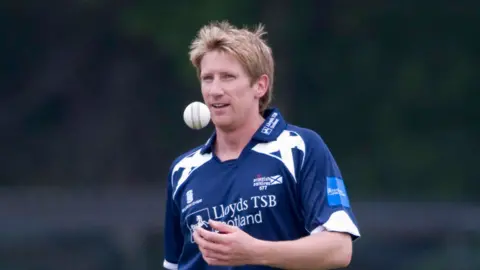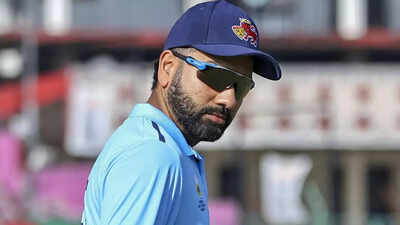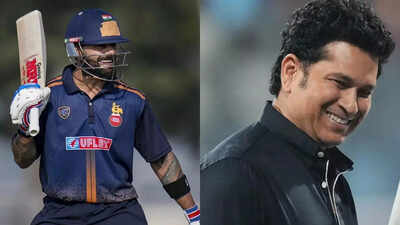 SNS
SNSA Scotland international cricketer has threatened legal action against the sport’s governing body after claiming he was the victim of racial discrimination.
Hamza Tahir, who was capped 49 times, claims he was unfairly dismissed and has announced his retirement from international cricket at the age of 28.
The bowler was speaking at a news conference where other former players and campaigners criticised Cricket Scotland’s handling of allegations of racism within the sport.
The organisation has repeated its apology to anyone who was the victim of racism and says five cases are going through a disciplinary process.
Mr Tahir claimed his international playing career had been held back by prejudice but that he had now decided “enough is enough”.
He said he had lodged a grievance and was prepared to pursue an unfair dismissal case after his contract was not renewed earlier this year.
As a south Asian cricketer, he said he had to “work twice as hard to be on the same level as others, to get he same opportunities as others on big stages, being treated differently with many obstacles being put in my place”.
In a statement, Cricket Scotland thanked Mr Tahir for being a “tremendous servant to the Scotland men’s national team” but said the contract decision was taken on grounds of performance.

A second former Scotland cricketer, Majid Haq, also spoke at the news conference.
He criticised the governing body for urging mediation rather than taking disciplinary action in response to complaints.
“The victims can only move on once people have been held to account,” he said.
“Moving on suggests forgetting about what has happened but you can’t just forget”
Lawyer Aamer Anwar, representing the cricketers, accused the sport’s governing body of using “lack of jurisdiction” as an excuse of failing to take action.
He said there was a “toxic culture of denial” and lack of support for people who made complaints, which was driving people away from the sport.
“You get to the point where you think there’s no point in carrying on, and you leave and they get their end result,” he said.
“They get their all-white team practically, they get their racially-segregated team.”
Two years ago, complaints by Majid Haq and another former Scotland player Qasim Sheikh prompted an independent review which found that the governance and leadership of cricket in Scotland was institutionally racist.
The Changing the Boundaries reportcarried out by a consultancy for national sports agency SportScotland, listed 448 examples of racism and discrimination.
A day ahead of the report’s publication, the entire board of Cricket Scotland resigned.
However, the cricketing community in Scotland remains deeply divided over the issue.
A former chairman of Cricket Scotland, Tony Brian, has denied the institutional racism finding and questioned the robustness of the review.
Claims by Cricket Scotland of good progress in response to the racism report have also been criticised by some anti-racism campaigners.
Following the Changing the Boundaries report, Cricket Scotland said it was looking into 43 allegations of racismbut only five have progressed to disciplinary procedures.
 SNS
SNSEarlier this month, former Scotland international cricketer John Blain claimed he had been told in January he had been cleared of racism but was was still waiting for the finding to be published.
He criticised the delay, claiming his life had been put “on hold” and accused Cricket Scotland of “running scared”.
In a statement, Cricket Scotland said it had utmost sympathy for anyone who had experienced discrimination in cricket.
It said it had consulted with numerous partners – including anti-racism campaigners – in drawing up its new grievance and investigation process.
Chief Executive Trudy Lindblade said: “I sympathise with those who harbour a feeling of injustice, and we will continue to engage respectfully throughout the mediation process.
“The only viable route to common ground is through independent mediation in order to achieve reconciliation.
“Only then can we speak openly and work together to provide an inclusive sport that we can all be proud of.”
She added: “Ongoing instability and recrimination, played out in front of the media, will only cause further damage to relationships and reputations, and deepen the wounds that need to heal.”






